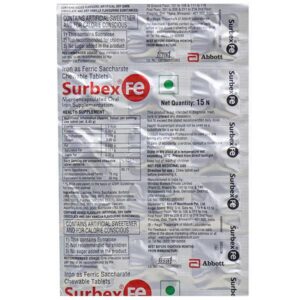VIT C + DESSICATED LIVER + FERRIC CARBOXYMALTOSE
Vit C: Drug Name: Vitamin C (Ascorbic Acid)
Description: Vitamin C is a water-soluble vitamin that is essential for various physiological functions in the human body. It is a naturally occurring compound found in many fruits and vegetables, and it is also available as a dietary supplement.
Use: Vitamin C is primarily used to prevent and treat vitamin C deficiency. It is also used for its antioxidant properties and as a supplement to support the immune system.
Mechanism of Action: Vitamin C acts as a cofactor in numerous enzymatic reactions involved in the synthesis of collagen, carnitine, and neurotransmitters. It helps in the absorption of iron and supports the formation of red blood cells. Additionally, vitamin C is a potent antioxidant that protects cells against damage from free radicals.
Dose: The recommended daily allowance (RDA) of vitamin C varies depending on age, sex, and certain conditions. The RDA for adults is generally around 75 to 90 mg per day. Higher doses may be required for individuals with specific conditions or in certain situations, such as during illness or pregnancy. It is important to consult a healthcare professional for personalized dosing recommendations.
Side Effects: Vitamin C is generally safe in recommended doses; however, higher doses (above 2000 mg per day) can cause gastrointestinal disturbances such as diarrhea, nausea, and abdominal cramps. Rare cases of kidney stones have been reported with excessive vitamin C supplementation. Individuals with certain medical conditions, such as kidney problems or a history of oxalate kidney stones, should exercise caution and seek medical advice before taking high doses of vitamin C. In some individuals, allergic reactions or skin rashes may occur when taking vitamin C supplements.
Dessicated Liver: Desiccated Liver, also known as liver extract, is a dietary supplement made from the dehydrated liver tissues of animals, usually cows or pigs. It is commonly used as a nutritional supplement to support liver health and overall well-being.
Mechanism of Action:
Desiccated Liver is rich in essential nutrients, including vitamins (particularly B vitamins), minerals, proteins, and other compounds necessary for the proper functioning and health of the liver. It is believed that these nutrients support liver health by providing the necessary building blocks for liver cells to regenerate and maintain their function.
Use:
Desiccated Liver is primarily used as a dietary supplement to support liver function and promote overall health. It is often taken by individuals looking to improve energy levels, enhance athletic performance, boost iron levels, support detoxification processes, or improve overall nutrition.
Dose:
The recommended dose of Desiccated Liver may vary depending on the specific brand and formulation. Generally, the typical dosage ranges from 1-4 grams per day, divided into 1-2 separate doses. However, it is important to follow the instructions provided by the product manufacturer or consult with a healthcare professional for personalized dosing recommendations.
Side Effects:
Desiccated Liver is generally considered safe for most people when taken as directed. However, some individuals may experience allergic reactions or digestive discomfort, such as bloating, nausea, or diarrhea. Due to its high vitamin A content, excessive intake of desiccated liver over a prolonged period may lead to vitamin A toxicity, which can cause symptoms such as fatigue, irritability, hair loss, and liver damage. It is important to stick to the recommended dosage and consult a healthcare professional if any adverse effects occur.
It is also worth noting that Desiccated Liver is derived from animal sources, so individuals with specific dietary restrictions, allergies, or ethical concerns should exercise caution or consider alternative supplements.
Ferric Carboxymaltose: Ferric Carboxymaltose is an intravenous iron supplement medication used to treat iron deficiency anemia. It is typically prescribed when oral iron supplements are ineffective or cannot be used.
The mechanism of action of Ferric Carboxymaltose involves the delivery of iron directly into the bloodstream. The iron is then utilized by the body to produce hemoglobin, a protein responsible for carrying oxygen in red blood cells. This helps to increase the hemoglobin levels in individuals with iron deficiency anemia.
The dose of Ferric Carboxymaltose depends on the patient’s weight and level of iron deficiency. It is administered as a slow intravenous infusion and the total dose is usually divided into multiple sessions. A healthcare professional will determine the appropriate dosage and administration schedule based on the individual patient’s needs.
Common side effects of Ferric Carboxymaltose may include headache, dizziness, nausea, vomiting, joint pain, muscle pain, and injection site reactions such as pain, swelling, or redness. Less common side effects may include allergic reactions, low blood pressure, and changes in liver function.
It is important to note that Ferric Carboxymaltose should only be used under the supervision of a healthcare professional, as it is associated with an increased risk of serious hypersensitivity reactions. Patients should be monitored closely during and after administration for any signs of a reaction.
Overall, Ferric Carboxymaltose is an effective treatment for iron deficiency anemia, but its use should be guided by a healthcare professional to ensure proper dosing and monitoring for any potential side effects.

